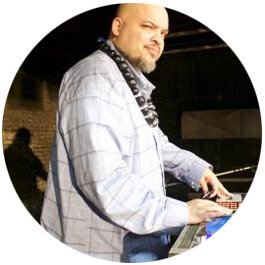January Artist Spotlight: Ambassador for Hip Hop Culture - DJ Kool Akiem
/DJ Kool Akiem! Thanks so much for taking the time to tell us a little about your work as an artist. Can you tell us a little about what your background and what your art form is?
I am a DJ and music producer. I've lived a lot of different places but mostly grew up on the North Side and graduated from Minneapolis South. I started DJing and making beats in high school. I’ve done pretty much every type of DJing there is and could talk about it endlessly, from weddings, quinceañeras and bar mitzvahs, to radio shows, clubs and touring with rap groups. Probably most notably I was MF DOOM’s tour DJ for awhile. I’m also a music producer and have been a part of several labels, most notably I’ve released albums on Rhymesayers.
When did you first become interested in DJing?
My father was a radio DJ for many years, for a while on KMOJ and he helped me get my first set of professional turntables. I had the wrong kind for a while starting out. The type of DJing I was interested in was hip hop though which was quite a bit different.
What do you feel is most misunderstood about Hip-Hop culture?
Probably the most misunderstood thing is the Art of Sampling. It’s often seen as just stealing other people’s music, borrowing at best. To get a better understanding of it you need to understand the history and development of the art form. People tend to think the reason for people using it as a technique is the lack of composition ability. But I think people who learn about the development of the art form can gain an appreciation, not only for the reasons for employing it but also the skill and artistry used. I am currently developing a lecture that will trace the history, thought processes, discoveries and techniques of sampling. I think people will find there is a nuanced science to the art form, even some esoteric and spiritual concepts being part of it.
What do you get out of teaching versus creating your own work? What do you enjoy the most about teaching?
One of the interesting things about Hip Hop DJing is that it is, historically, very competitive and often very secretive when it comes to pretty much every facet. In the past I would never have imagined teaching what I know openly the way I do now. Because of the internet’s free flow of information and I think hip hop artists maturing in general, things have changed greatly. At a certain point for me to begin teaching I decided to become an open book in terms of the wisdom I am willing to impart to anyone interested. I think it may also be a function of considering my legacy. So just speaking about what I know has actually become very joyful for me — I really have an endless amount of words to say in regards to every aspect of DJing, for those who care to listen.
What do you see as the benefits of working in Minnesota’s music scene?
Minnesota has a rich history of musical path forgers and legends. We have notable artists like Bob Dylan, Prince, and John Denver. I started DJing when I was fifteen, inspired by my father who was a DJ on KMOJ radio. Between 1990 and 2007, I was away from Minnesota's music scene and was DJing clubs and developing music in Atlanta and New York City. Now that I've been back for a little over a decade, I've been reintroduced to former collaborators and artists who were once opening acts for my music group – who are now defining what Minnesota hip hop sounds like. I've enjoyed going to concerts and mentoring emerging artists when I can. My focus these days have also shifted to sound design for theater.
You’ve been on the COMPAS roster since 2014. What’s it like for you to be a part of COMPAS?
COMPAS is great. I've been able to connect with educators and their students who I otherwise may not have. I feel fortunate and honored that I am a sort of ambassador for Hip Hop culture and the art of beatmaking and turntablism. I think that it's so essential for young people (and all people) to be up close and engaged with what Hip Hop heads refer to as the back bone of Hip Hop culture - the turntables. When I'm able to bring my turntables and beatmaking instruments into classrooms and see my set up light up or spark curiosities, I know that it's going to be a fun and informative day.







